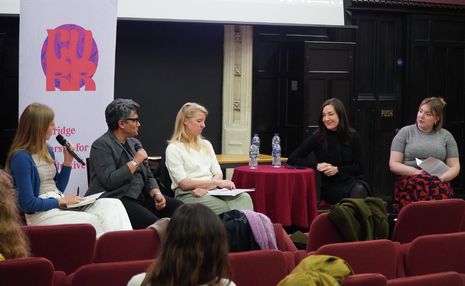‘Let the despair drive you’: reflections on running CURR
Tara Buxton reflects on Cambridge’s feminist scene with Helena Stolnik Trenkić and Emma Munday, the co-founders of CURR

Sat across from Helena Stolnik Trenkić and Emma Munday, I am transported back to my first week at Cambridge. As a wide-eyed fresher trying to find her feet in the university’s feminist scene, I attended a talk hosted by Cambridge University for Reproductive Rights (CURR) – a society that I’d set my sights on since excitedly showing my sister the termcard. Face to face with the co-founders in Queens’ College MCR, that passion returns.
“It was the 2022 overturning of Roe v Wade in the US that catalysed the society’s creation”
“I felt like there was somewhat of an activism gap in Cambridge,” remarks Helena, co-founder and president of CURR since its genesis in 2022. She reflects on the feminist community in Cambridge back when she started her undergrad in 2017: “there were college Feminist Societies that built this female community at colleges, but not quite so much, you know, teeth”. She felt that colleges and the SU could fall short of necessary practicalities. “Activism is not very sexy, it’s very bureaucratic; you have to be in it for the long run”. Emma, the co-founder and current treasurer of CURR, builds on Helena’s assertion. On arriving at Cambridge in 2021, she recalls that “the feminist scene didn’t feel very directed” and “it didn’t attract very many people in”.
Helena stresses the important difference between a feminist group and a women’s group. “You have to take that step and ask, why have we built this community? To advocate. There has to be this active component to feminism”. CURR’s events exemplify this aim: they collect donations and signatures for causes, attend protests, and offer workshops on argumentation skills. “These events focus primarily on reproductive rights in the UK, where abortion is still under criminal law, IVF is a postcode lottery, and maternal mortality rates are rocketing”.
But it was the 2022 overturning of Roe v Wade in the US that catalysed the society’s creation. “Anybody who was paying any attention would’ve seen it coming,” Helena emphasises. My question about the fight for reproductive rights during Trump’s presidency prompts an understandably exasperated sigh. “The amount of preventable deaths, it honestly makes me feel sick,” Helena states.
“If progressives organise, they can win”
She is referring both to abortion restrictions within the US, which have left women dying of sepsis, as well as the global impact of American “pro-life policies”. “During Trump’s last administration, a Republican restriction blocked US health aid to organisations that mention abortion, annually contributing to an estimated 30,000 additional preventable deaths in the Global South. This administration’s dismantling of USAID will prove even more disruptive”. “This is not just a moral emergency to do with individual liberties and self-determination, it’s a public health crisis,” Helena underlines.
Emma attempts to extract a lesson from the frankly despairing situation. “There was no seriously dedicated opposition to the Christian nationalist anti-abortion groups,” she observes, “so the message is that we need to build directed campaigns, to not be complacent, to focus on this as a single issue”. She comments that a key problem in the US is that abortion became associated with one political party. “It’s important to keep single-issue fights as broad a coalition as you can. It’s dangerous for an issue to become an issue for just that side. At CURR, we have had people of all political persuasions on our committee”.
Since the pair are in the final stages of their studies at Cambridge, with Emma completing her Engineering Master’s and Helena her History PhD, I asked them for their retrospective reflections on the experience. “We were worried that we had to be perfect at running a society, or that people would criticise our intentions,” Emma remembers. “It’s been the complete opposite. People are really eager to get their teeth into something. They’re less cynical than I made out”.
We discuss the tangible changes their society has made. After donating around £3,500 to pro-choice and sex-education charities, they have received many letters back detailing the impacts of their money. Helena advises “not to let despair drown you. Let it drive you”. She is most proud of the panel she ran on reproductive rights in humanitarian crises, thinking about Gaza, Ukraine, and South Sudan. She was nervous to run the talk, but the feedback she got was that it was one of the most thoughtful and nuanced interventions on the impacts of conflict that most had ever attended.
Finally, I ask the pair about their hopes for CURR’s future. “I think that we both think this is a very difficult time for women’s rights, for feminism. What’s happening now is creating something new and terrifying”. As a “perennial optimist,” Emma believes that “if progressives organise, they can win”. She wants CURR to be a space in which anyone can contribute “whatever their background, whatever their interest in reproductive rights”. Both highlight that applications for the CURR committee will open in Michaelmas for anyone who wants to get involved.
 News / Judge Business School advisor resigns over Epstein and Andrew links18 February 2026
News / Judge Business School advisor resigns over Epstein and Andrew links18 February 2026 News / Hundreds of Cambridge academics demand vote on fate of vet course20 February 2026
News / Hundreds of Cambridge academics demand vote on fate of vet course20 February 2026 News / Petition demands University reverse decision on vegan menu20 February 2026
News / Petition demands University reverse decision on vegan menu20 February 2026 News / CUCA members attend Reform rally in London20 February 2026
News / CUCA members attend Reform rally in London20 February 2026 News / Caius students fail to pass Pride flag proposal20 February 2026
News / Caius students fail to pass Pride flag proposal20 February 2026










